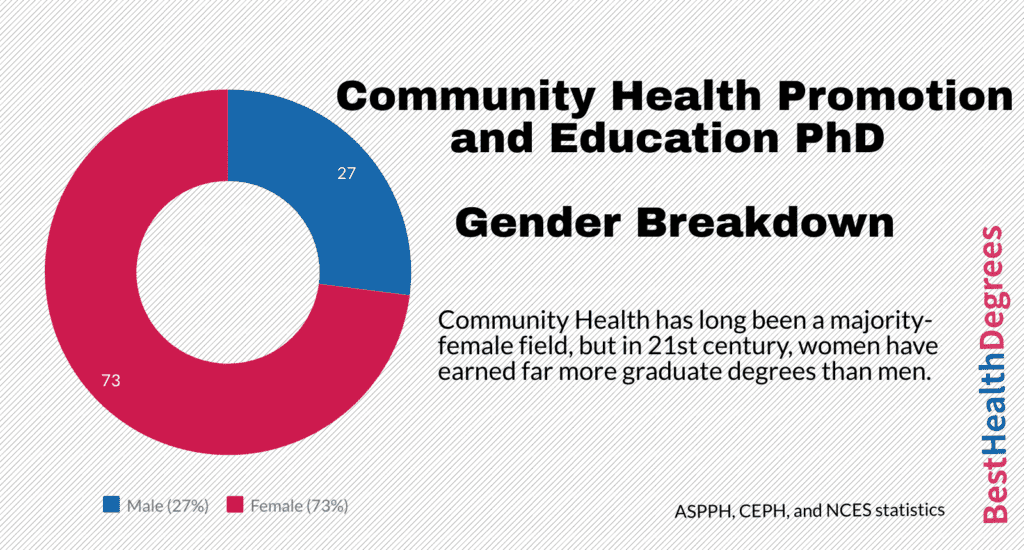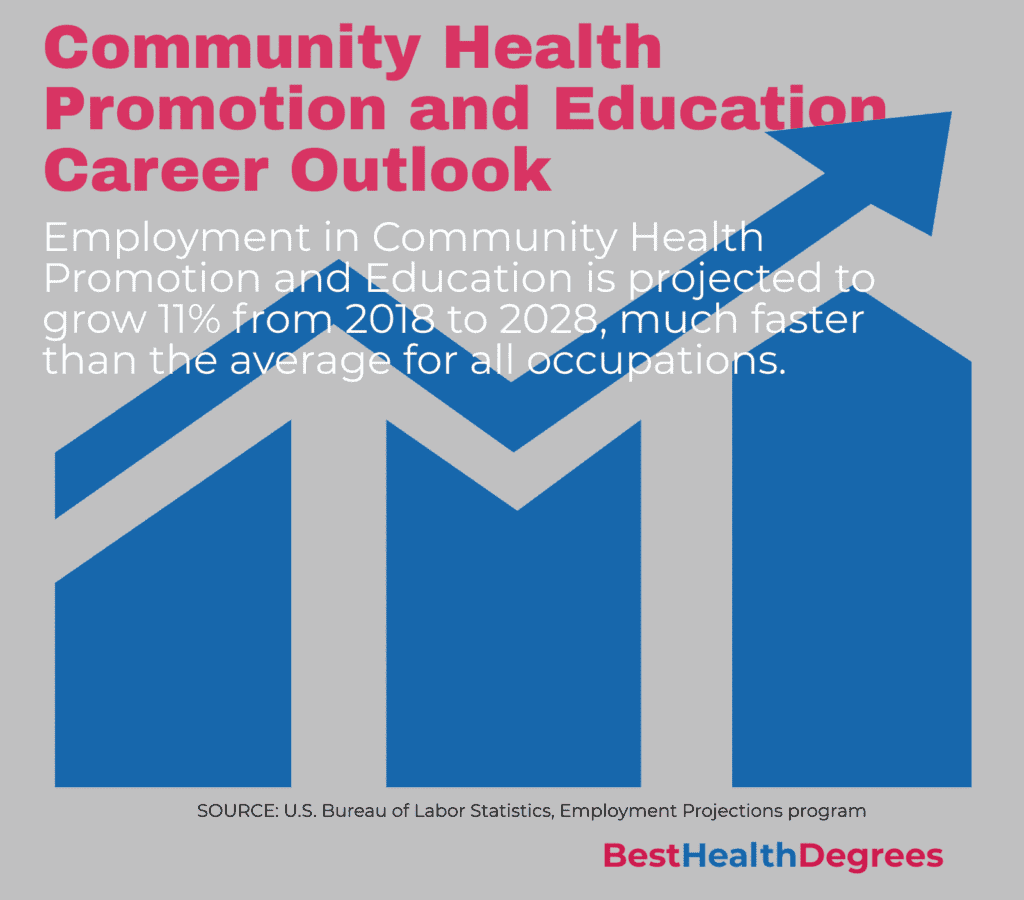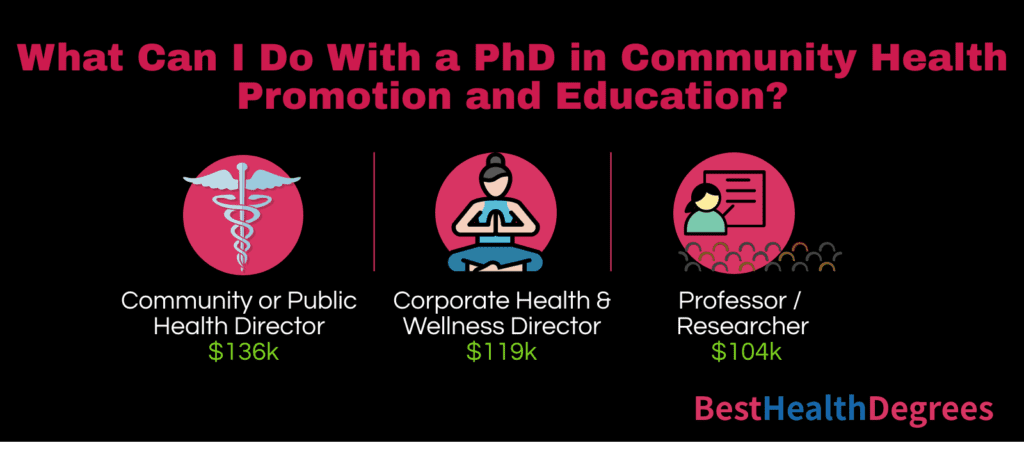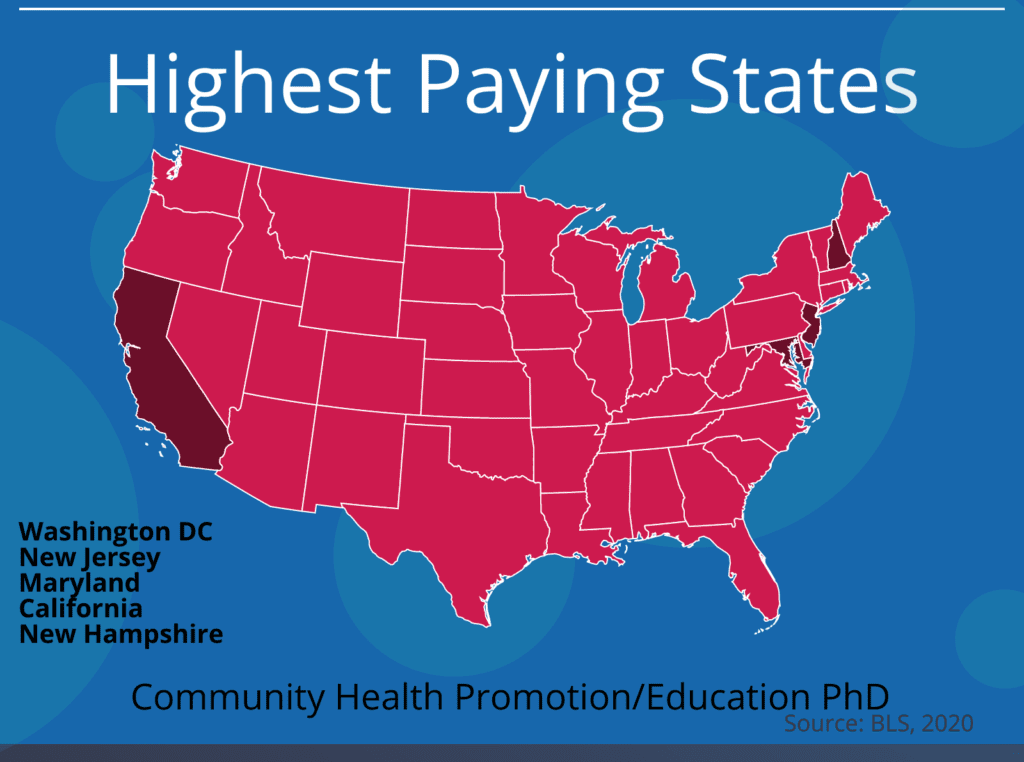Jobs in Community Health Education include both clinical and direct care options for individuals with a PhD in community health education. Do you love your community and want to make a difference in the health of the people in your area? Earning your PhD in community-based health promotion or health education is a great way to help people. You will learn about public health, disease prevention, preventive care, and how to help people get the affordable healthcare treatment they need.
What is Community Health Education and Promotion?
Do you wonder what community-based health promotion entails? The field is decades old. However, it’s come under the spotlight recently with the onslaught of the COVID-19 crisis. In today’s information age, misinformation is everywhere. So, many communities are searching to find trusted experts that can help them keep their families safe.
There are many different career options for people that want to work in community health promotion. With a PhD in this field, you can make a difference in your community and advance your career. So, to help you decide if this field is a good fit for your career goals, keep reading.

What Does a Community Health Educator Do?
Like public health, community-based health promotion can take many forms and can differ widely depending on the needs of each community. In some areas, community health promoters work to address common health issues within the population. In others, they work to help citizens get access to care.
These professionals may also serve as advocates for people struggling to get the care or education that they need. They can work as liaisons between social services providers and other healthcare providers. Or, they may train medical staff in a particular community about cultural awareness. Some may educate policymakers about the importance of creating smoke free areas. So, in all these examples these educators identify health related issues and then find a way to promote wellness.
The job of a community-based health promotion educator can differ depending on the needs of the community. In order to be successful in this field, professionals must stay on top of the latest research. Then they adjust health education programs and policies in order to meet the changing needs of your community.
Why the Community Development Approach to Health Promotion?
For many health issues, education is the first step to prevention and effective treatment. For a community health educator, a community development approach means working to assess the needs of a particular area and then working to meet those needs. They may work with public health departments and nonprofit organizations to help manage government programs. Or oversee programs for private health services at hospitals and other healthcare facilities.
The goal is to understand the needs of various populations within a community. Ideally, these health initiatives or health education programs work in tandem to create a stronger, healthier community. For example, public health campaigns promoting healthy behaviors can promote health and also help people find health services. Grant funded programs that focus on substance abuse or mental health help individuals adopt healthy behaviors and also find healthcare services.
What Can I Do With A Community Health Education Degree?
There are many options for employment after you earn your PhD. With a doctoral degree, you will be a health expert in your community. Experienced community health workers typically interact with the public and also other public health officials.
You may work in local or state government, for a private health organization, or as a private consultant. People in these jobs often work to develop health education programs and initiatives that benefit the health of the overall population. You may also create these programs, collaborating with fellow health experts on research and community education. Working as a community health educator is an excellent way to put your passion for quality healthcare to good use.
Accreditation for Community Health Promotion and Education Programs
There is no specific accreditation body for graduate public health education programs. So, it’s essential to ensure that you’re completing a program at a reputable university. There are ways to ensure that you’re choosing a program that future potential employers will see as worthwhile.
Since there is not a governing body for graduate public health degrees, students should make sure the school has accreditation. The school may have accreditation from The Higher Learning Commission or another regional accreditation board. Also, make sure the US Department of Education recognizes the accreditation board.
How to Choose a Program
While most PhD programs are extremely reputable, there are some that function as “degree mills”. They push students through the program as quickly as possible while collecting tuition money. Be sure to do your research on schools that you’re considering. And take your time before you decide to put down a deposit.
First, talk with a potential academic advisor before you commit to a school. Below are a few questions that you can ask to determine if the institution is reputable.
- What’s your alumni involvement like?
- Can I contact a successful alumnus/a of your program?
- How many of your graduates find jobs upon graduation?
- What percentage of students who enroll in your program graduate?
- How long does it take students to graduate, on average?
Additionally, you should be able to find the names of faculty members for your PhD program on the institution’s website. A quick web search can help you see whether they’re reputable. In a PhD program, faculty members should have published research and a solid internet presence. You may struggle to find information on a school or come across bad reviews from previous students. If so, it may be a sign that you should move on to a different program.

Types of Health Promotion and Education Doctoral Degrees
When you’re working through the process of finding the right health promotion PhD program for your career goals, you’ll find that you have many options. Whether you’re focusing solely on health promotion PhD programs, you want to be a community health educator, or you’re focusing on programs that combine the two titles into a doctorate in health education and promotion. However, most degrees in this field focus on helping communities get and stay healthy.
When you research health promotion PhD programs, you’ll find many options for traditional, hybrid, and online programs. There are benefits to each option. And each avenue can allow you to forge a successful path to earning a doctorate in health promotion.
Traditional Degree Options
Choosing a traditional option for your PhD in health promotion means that you’ll spend much of your time in the classroom. If you’re able to focus solely on your education right now without having to worry about other responsibilities, traditional education may be a good fit for you. Traditional education as you earn your PhD in health promotion means that you’ll get plenty of face time with professors, and you’ll be able to participate in on-campus research projects in a hands-on way.
Online Degree Options
Getting your doctorate in health promotion online is another option that can work well for many people. When you get your PhD in health education and health promotion online, you can create your own classwork schedule. This means that you can continue working in your 9-5 job while getting your education in your spare time. Be sure to talk with your admissions officer about the requirements for the online program.
While most online PhD in health education and health promotion programs allow you to complete work on your own time, others require that you’re online at specific times to participate in lectures and discussions with others. Many PhD in community health promotion and health education programs that take place online are largely made up of nontraditional learners with a wealth of real-world and professional experience. This can make for lively discussion boards and group projects that allow you to learn firsthand from other professionals in your field.
Hybrid Degree Options
For the best of both worlds, consider earning your PhD in community health promotion and education through a hybrid program. A hybrid doctorate in health education and promotion program combines online education with traditional education. This format allows you to complete some of your classes remotely and others on campus.
In a hybrid PhD community health educator program, you may be able to choose which classes you take online and which classes you take in the classroom, or the course schedule may be set for you. Be sure to talk with your admissions officer about scheduling options for your hybrid online health education and promotion doctorate degree so you can ensure that the program is a good fit for your needs.
Specialization Options Within Health Promotion PhD Programs
Whether you choose traditional or online doctoral programs in community health, you’ll find that there are many specializations available.
Research
Earning your doctorate in health promotion online with a specialty in research prepares you to be at the forefront of learning more about healthcare. This specialty is relatively uncommon. Therefore, earning your PhD in health promotion online with a specialty in research will put you in a unique position upon graduation to work in a research lab that studies how to improve health initiatives in communities.
Global healthcare
Earning your doctorate in health promotion online with a specialty in global healthcare allows you to study how healthcare differs around the world. This online health education and promotion doctorate degree allows students to take aspects that work from various cultures and understand how those techniques could improve healthcare in other cultures. This specialty also allows students to understand how healthcare access, poverty, food availability, literacy, and other factors affect healthcare in communities around the world.
Management and leadership
Doctoral programs in community health focus on management and leadership. These roles are ideal for professionals who understand that health education programs and initiatives need to be set into motion in order for the public to benefit. Earning your health promotion doctorate with a focus on leadership will prepare you to move communities in the right direction. And at the same time, you will lead the people who can make significant changes on a local level.
Food studies
Many healthcare professionals have begun to emphasize the importance of nutrition. Furthermore, many online doctoral programs in community health are beginning to offer food studies specialties. When you earn your health promotion doctorate with a specialization in food studies, you’ll learn how food deserts, food access, and hunger issues affect communities, and you’ll be able to work to develop solutions to these issues.
Population Healthcare
Doctoral programs in community health that offer a population healthcare specialty allow students to learn about the macro factors that affect healthcare. This type of Ph.D. in health promotion online focuses on how attitudes, psychology, history, access, and other factors affect healthcare issues around the world. It also discusses the solutions that need to be put into place to create improved health worldwide.

Careers in Health Promotion and Education with a Doctorate
There are many community health educator jobs that will allow you to put your degree to good work. Jobs in community health promotion are on the rise due to the COVID-19 crisis, and the position is now more important than ever. Let’s take a look at some of the community health educator jobs for which you’ll be well qualified after you finish your degree.
When you earn your PhD, many of the health science community health education jobs will be in supervisory or research roles. Did you enjoy the direct work with community members that you’ve had in your career thus far? If so, remember that you can always jump in with your instructors as they work in health education. You can help teach health classes, work with the public, and do the grassroots work that you love.
Most states do not require community health educators have a certification. However, some employers prefer individuals with the Certified Health Education Specialist (CHES) credential. It is offered by the National Commission for Health Education Credentialing (NCHEC). Another common credential is the Certified Diabetes Care and Education Specialist (CDCES). This credential is from the Certification Board for Diabetes Care and Education (CBDCE).
Jobs in Community Health
The community health educator job description and the community health educator definition can vary greatly from community to community and can look different in various healthcare education settings. Generally, workers collect data and then discuss health concerns with members of a community. Let’s take a look at some of the community health education jobs for professionals who have their PhD in community health promotion and education.
Public health program evaluator
One of the most important community health promotion jobs is a public health program evaluator. These professionals find out what’s working and what isn’t working within community health programs. This information is used to influence policies and also care and health outcomes. Health professional jobs at this level are supervisory in nature, and often require leadership skills and the ability to manage a team. These community health workers typically interact with both researchers and the community. So, they need excellent instructional skills and also interpersonal skills.
Disease specialist
Disease prevention community health promotion specialist jobs require you to become an expert on a specific disease or group of diseases. These health education degree jobs can involve staying on top of the latest research and talking with other experts in the field. Then, they develop education programs for the communities and populations most likely to be affected by the disease. Workers in government positions may also develop materials to help prevent costly diseases.
Health Education specialist
Most Health Education Specialists only have a bachelor’s degree. But some health education specialist positions require a master’s or doctoral degree. Some Health Education Specialists work on public health campaigns. Topics may include proper nutrition, emergency preparedness, immunizations, or stress management. Additionally, they may provide safety information during emergencies. Some work to develop programs to improve employee health.
In a few areas, these professionals only need a high school diploma and learn through on the job training.
Non-profit health education supervisor
Community health promotion specialist jobs with non-profit organizations require supervisory experts who have a wealth of knowledge in their field. When you work non-profit jobs in community health promotion, you’ll supervise a team of specialists. Typically these health education specialists collect information on programs and report to their supervisors the latest well-researched information. They also help organizations obtain funding. Non-profit community health educator jobs range from health and disease awareness to school health education.
University health education supervisor
One of the top community health educator jobs is working with college students in a university setting. These jobs for health education majors can allow you to focus on your area of interest, whether that’s sexual health, physical fitness, nutrition, or other areas of concern to the young adult population.
These roles and community health educators jobs for professionals who have their PhD often involve supervising graduate student health counselors. They counsel students on how to get and stay healthy in a stressful university setting. Some also help students develop academic and social skills to complete school and enter the workforce.
Policy developer
Are you interested in changing the world of healthcare? Then, a Policy Developer may be one of the jobs for health education majors that makes the most sense for you. These community health education specialist jobs allow you to impact the legislation affecting public health for years to come. You’ll also be working to create funding for other community health educators’ jobs, positively impacting the field.
Professor
As a public health instructor, you’ll get to teach students and help develop the next group of minds that will shape the policies that affect the health of future generations. Whether you teach introductory or more advanced policy change classes, being a community health educator is a rewarding job!
Now that you know about some community health degree jobs, let’s explore the different salary ranges for people who work in the field.
Salary Expectations for Community Health Professionals
When you’re considering getting your degree in community health education and promotion, it makes sense that you want to know more about the PhD in health promotion salary. Are you getting into the field because you care about helping others? If so, you also need to ensure that you’ll be able to make a comfortable living as a community health educator after you finish your schooling.
Many factors can affect a community health educator salary. Still, most people with a PhD find that a community health educator’s salary provides them with enough money to live comfortably while still paying back their student loans.

Factors that Effect Salary
Now, let’s examine the community health education salary. Several factors can affect the salary of community health educator jobs.
Funding
Your community health promotion specialist salary may depend on the funding available to your community or organization. Your community health educator specialist’s salary may be higher in an area with a budget for health education interventions.
Cost of living
The cost of living will be a determining factor in your PhD in health promotion salary. The higher the cost of living in your area, the higher your salary will likely be. As you search for community health promotion specialist salary options, you’ll want to keep the cost of living in mind. A job in a large city may pay more because the cost of living will be higher than in a small town.
Experience
Your experience can help to determine your community health educator’s salary. If you’ve worked as a professional in the field, you can leverage your experience into a higher salary offer.
Specialty
Your specialty during your education can also determine your community health educator’s salary. If you choose a highly in-demand field, your salary may be higher than a field with more people capable of doing the job. Your research in your specialty can also contribute to a higher salary offer.
How Much Can You Make?
Generally, you can expect the following average salary ranges for jobs with a community health degree.
- Community Health Professor – $72,350 average
- Public Health Program Evaluator – $96,009 per year
- Non-profit Health Education Supervisor – $21,500 to $104,000 per year
- Director of Health Education Supervisor – $46,000 to $117,000 per year
- Community Health Policy Advisor – $19,500 to $124,000 per year
Professional Organizations Health Promotion and Education
As you move through your community health educator career, it’s key that you involve yourself in professional organizations. Some community health promotion and education professional organizations include:
- American Public Health Association (APHA)
- National Commission For Health Education Credentialing (NCHEC)
- Public Health Learning Network (PHLN)
- Society For Public Health Education (SOPHE)
Connecting with other community health professionals offers networking opportunities. You can learn about new job opportunities and participate in classes to earn continuing education credits to stay current on the latest research.
Other Career Paths
If you are undecided about pursuing a PhD in community health, you wan want to explore some similar degree fields. These similar occupations include Social Work, Mental Health Counselors, Health Administration, Public Health, Family Therapists, or Registered Nurse.
There are many jobs in health education and promotion. And with a PhD, your salary will be very high!
Related:
- 25 Best Community Health Promotion and Education PhDs
- 15 Best Online Community Health Promotion and Education PhDs
- 10 Fastest Online Community Health Promotion and Education PhDs
- What Can You Do with a Human Service Degree?
- Kinesiology and Exercise Science Salary with an Associate Degree
- Best Types of Counseling Degrees
- What are the Best Master of Health Science Jobs?




